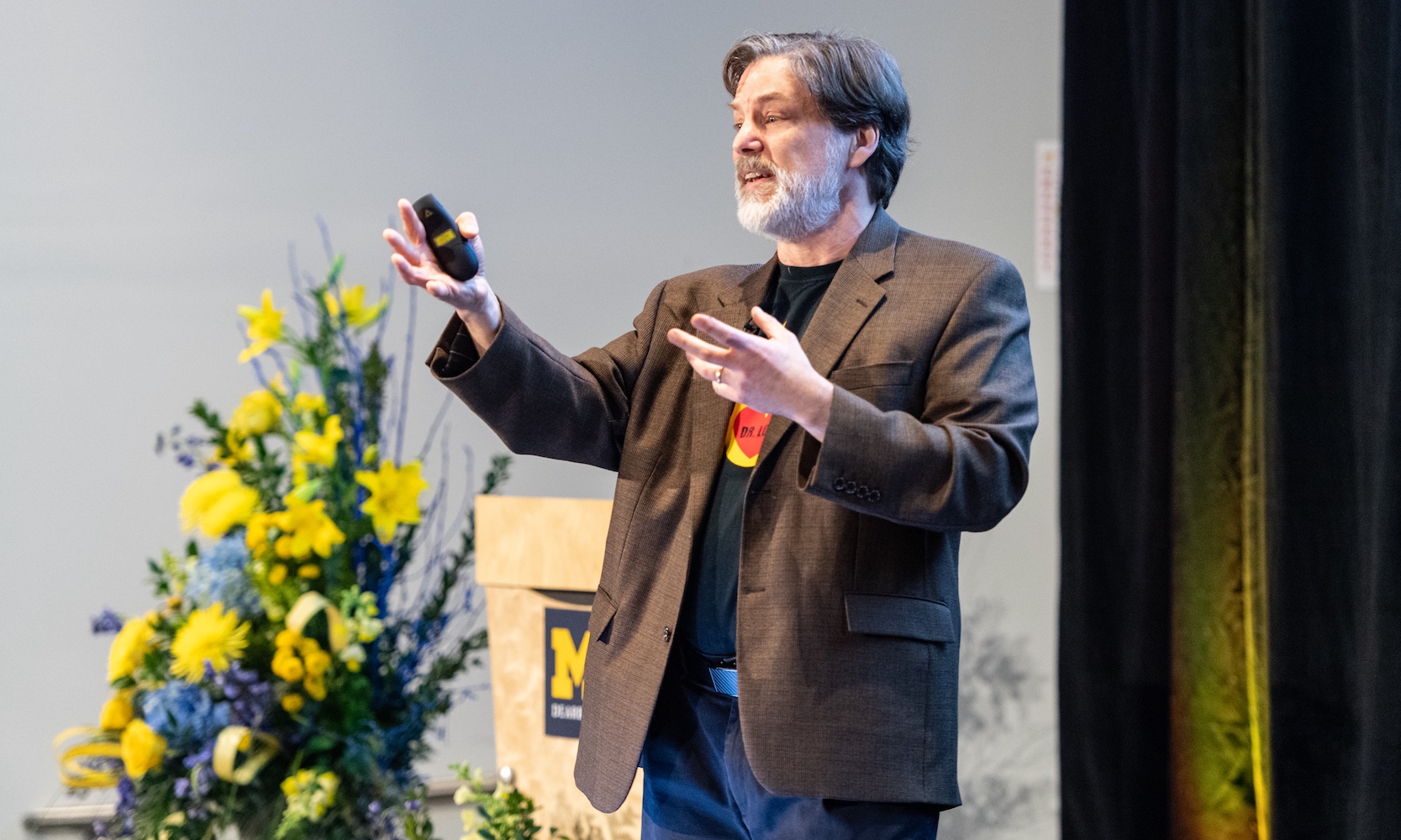
The Beatles have said that money can't buy love. Well, it turns out that the Fab Four might be wrong.
There is a chance that it may — if a brand is treating their consumers right or if what we buy gets associated with having human qualities.
This is the type of thing that Marketing Professor Aaron Ahuvia specializes in. He's consistently researching how our love for things — he's presented his research to or consulted for Procter & Gamble, Audi, General Motors, Microsoft and Ford, among others — relates to our love for people, and more generally how brands, money and spending influence our happiness.
His findings have been featured in The New York Times and on National Public Radio. His teaching helps his students better understand consumerism. And when Ahuvia isn’t on UM-Dearborn’s campus, he’s working with several Fortune 500 clients to look at brand impact and effectiveness.
On campus, many of us know he likes to casually chat about things he finds interesting, like why more and more items that we see in the marketplace appear to have faces (we’re looking at you Porsche). Or, if you ask, what it was like to be a guest on the Oprah Winfrey show.
His decades of research into questions such as ‘Can we really love a brand?’ have given Ahuvia expert designation in marketing circles. And he recently earned the first Consumer Brand Relationships Association’s Lifetime Achievement Award for Industry Impact.
Recently, Ahuvia gave The University of Michigan-Dearborn Reporter insight into how we are affected by our American consumer surroundings and what this means.
Reporter: You are the first researcher who empirically looked at the psychology of love when it comes to loving something rather than someone. Do you really believe people can love objects?
Aaron Ahuvia: Yes, I do. Most people love a thing or two. But love isn’t the most typical way we relate to objects, activities, or other things. Our brains don’t work like that. Our brains evolved to love certain people such as family members and close friends, but to screen out things from love. So if you love a thing, such as a hobby, your cell phone or a favorite brand, there is something a little weird going on. That’s one of the things that makes our love for things so interesting.
R: If it isn’t a natural thing, what makes it happen?
AA: To love an object or brand, your brain needs to treat it in a way that is analogous to the way you treat a person.
There are three main ways that it happens: No. 1. The thing you love is anthropomorphic, which means you see it as having human traits. Businesses do this on purpose, such as making the front of a car look like a face or using a banking app that has a Siri-like personality that gives you financial tips. This encourages your brain to treat this thing like a person, and therefore makes it easier to love. No. 2. It connects you to another person. For example, if you get a gift from someone you care about, you cherish it. If you have a falling out with that person, your feelings may change toward it too. And No. 3 — this one is the most common —it is an extension of how you see yourself as a person. Since you love yourself, you come to love the object too.
R: You know consumer psychology. What advice do you have for smarter shopping?
AA: It’s wonderful to live in a world surrounded by things that you love. Here’s a two-step process to making that happen.
First, if you have Netflix, you may have seen Marie Kondo’s Tidying Up, where she suggests you get rid of the clutter in your house by only keeping the objects that spark joy. Start by using that same approach with purchasing. Don’t create clutter in your house to begin with by not buying stuff unless you have a clear, specific need for it. And when you identify a real need, don’t get something you feel so-so about, even if it is on sale. Instead, take some of the money you’ve saved by not buying a lot of stuff, and use it to buy the thing that is really right for you, even at full price. In the long run, this saves time and money. Otherwise, you might keep buying more and more junk in an attempt to fill the void of the item — the joy-sparking object — you really wanted.
But loving the things in your life isn’t just about purchasing wisely, any more than a happy marriage is just about finding the right person. Rather, they are both about building a successful relationship over time. Nothing is perfect all the time. Objects aren’t. Services aren’t. And if you ask my wife, I’m not. So, the second step in the process is that once you get your new item home, cultivate a good relationship with it by using it a lot and becoming an expert with it (which may involve actually reading the instructions and watching YouTube instructional videos). This way you really get the most out of it. Love isn’t something that comes with the purchase, it’s something you make happen over time.
R: Since you received an award for lifetime achievement, let’s go back to your beginnings. Did a particular brand influence you growing up?
AA: I grew up in a pretty anti-brand environment and didn’t really love many brands. But that doesn’t mean that I wasn’t attached to things I owned. I loved the first nice bike I had, which was a Trek. I enjoyed biking and I felt a deep connection to it because it supported my values, like healthy living and clean transportation. I also loved a camera I bought as a teenager--a Canon EF, which was a nice camera in its day. I enjoyed photography a lot, was proud of having scraped together the money to afford it, and it connected me to a good friend who was also into photography.
R: Your parents weren’t into brands, but you are best known for your work on brand love -- to the point where you have a T-shirt that reads “Dr. Love”. What made you put brands and love together?
AA: When I was in graduate school at Northwestern University’s Kellogg School of Management, I had a professor (Philipp Kotler) who believed marketing was everywhere. He even believed dating was a form of marketing because you want to be attractive to others. I was single at the time, so it got my interest and I did my seminar project about dating as marketing.
He liked what I did and referred me to another professor (Mara Adelman) who was researching dating services — it was the 1990s and they were starting to get really popular. Nearing the end of graduate school, I had all of this great information about love and connection and I wanted to put it to good use. I realized that we are attracted to certain consumer products, like my Trek bike. So, for my dissertation, I put them together and looked at the connection between love and consumer preferences.
R: That’s thinking like a true entrepreneur. For readers who are at the beginning stages of a new venture, do you have marketing advice when it comes to building something new?
AA: Whatever you do, call or title it something that is a searchable term. I’m all about simple, but it also needs to be searchable.
For example, when I was younger, one of my favorite bands was Yes. But if someone asked me if I had a favorite band and I replied ‘Yes,’ I needed to clarify that I meant ‘Yes the band, not yes to your question.’ Competing with search results wasn’t an issue for a band in the 1970s , but can you imagine how hard it would be for a band called “Yes” to get noticed on the internet today?
Another example is calling your restaurant ‘Eat.’ It’s a good name, but it makes it impossible to find online. There’s actually a takeout place that I like with that name, but when I wanted the phone number and did an Internet search for ‘restaurant Eat,’ I couldn’t find it; I just kept scrolling through results. So factor in searchability at the very beginning.
R: While some of your research looks more generally at loving objects, a lot of your research specifically focuses on loving brands. What are your thoughts about brand love in particular?
AA: Some people love brands while others feel more alienated by the importance of brands in our society. But no matter how you feel, we are all surrounded by brands. Since brands play such a prominent role in our culture, we might as well have companies trying to make products that are so good that consumers actually love them. When companies try to get consumers to love their brands, it means the companies want to build lasting relationships with us. To do that in a long-term way, they need to figure out what really helps and satisfies us. If we are treated well, we stay loyal. And that’s how you get a brand love match.





